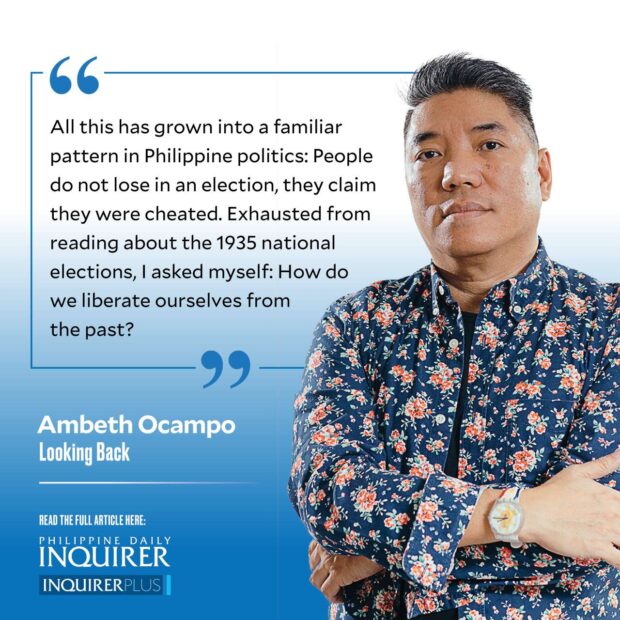Protesting the 1935 elections
 The first national elections in the Philippines were held on Sept. 16, 1935. All schoolchildren know that Manuel Luis Quezon was elected president and Sergio Osmeña vice president, but they do not know the details. Emilio Aguinaldo, Gregorio Aglipay, and Pascual Racuyal were the defeated candidates for president, while Raymundo Melliza and Norberto Nabong were the defeated candidates for vice president.
The first national elections in the Philippines were held on Sept. 16, 1935. All schoolchildren know that Manuel Luis Quezon was elected president and Sergio Osmeña vice president, but they do not know the details. Emilio Aguinaldo, Gregorio Aglipay, and Pascual Racuyal were the defeated candidates for president, while Raymundo Melliza and Norberto Nabong were the defeated candidates for vice president.
The 1935 election figures provided in the 2013 Philippine Electoral Almanac compiled under the direction of Manuel Quezon III are numbers and percentages that make sense when translated into visuals like a pie chart or, better still, as colors on a Philippine map: Quezon’s landslide win covers the entire archipelago with the notable exception of Aguinaldo’s Cavite and Aglipay’s Ilocos Norte. More impressive is the map of Osmeña’s win, which is almost completely shaded in his favor except for Cavite.
On Oct. 12, 1935, the Philippine Legislature canvassed the election results for president and vice president and transmitted these to US governor general Frank Murphy who, on Oct. 14, certified this in a communication to Franklin D. Roosevelt, president of the United States. Then as now, the losing candidates, Aguinaldo and Aglipay, claimed they were cheated. Aguinaldo sent two letters of protest to Murphy, dated Oct. 11 and 17, with accompanying affidavits that alleged serious election irregularities and fraud. These were dutifully transmitted to Roosevelt. Aglipay, on the other hand, sent a congratulatory message to Quezon, then called for a new election, stating that the election results as presented did not reflect the true will of the people. All these were documented in newspaper clippings compiled for Joseph Ralston Hayden that kept me busy in the University of Michigan Bentley Historical Library. The news may have been old, but the issues were eerily contemporary.
Justice Secretary Jose Yulo designated Jose Bautista, fiscal of Rizal, to lead the investigation. Wenceslao Vinzons, who I only knew as the name of a building in the University of the Philippines Diliman, was reported to have delivered speeches in support of Aguinaldo that bordered on sedition. To avoid arrest, he appeared at the justice department to explain that there was nothing seditious in his claims that:
“School teachers, policemen, and other government employees took an active part in the election campaign; school children were taught the Quezon March; officials were intimidating people favoring Aguinaldo with imprisonment; Aguinaldo’s councilors were threatened with suspension; and delinquent Aguinaldista landowners were subjected to embargo of their property, while Quezon followers in similar conditions were excepted.”
It is amusing that confident of a win, Aguinaldo pledged cooperation in victory or defeat only to go back on his word, alleging election irregularities in 25 of the 48 provinces. He declared:
“The result of the election was a great surprise to me. It is incredible, for instance, that in towns where we have election inspectors and officials of the National Socialist Party, I did not get a single vote. “If you take into account furthermore that all Filipino department secretaries, bureau chiefs, judges, fiscals, governors, municipal presidents, chiefs, and officers of the constabulary, teachers have been instructed by President Quezon, I have no doubt whatever that electoral manipulations shielded by official protection did not permit the people to freely express their will in this election.”
Attempts by supporters of the two defeated candidates to form a united opposition fizzled out because Aglipay said that, unlike Quezon who accepted the 10-year provision before attaining independence stipulated in the 1934 Tydings-McDuffie Act: “I have stood for immediate, absolute, and complete independence.” All this has grown into a familiar pattern in Philippine politics: People do not lose in an election, they claim they were cheated. Exhausted from reading about the 1935 national elections, I asked myself: How do we liberate ourselves from the past?
Comments are welcome at aocampo@ ateneo.edu




















